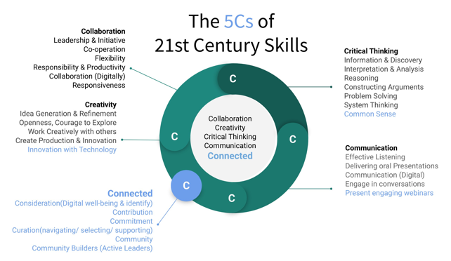Episode 17: Future proofing students: Developing students' 21st Century competences to be successful in industry
In this episode, Colette talks about how she integrated developing students' 5Cs (critical thinking, communication, creativity, collaboration and connectedness) by using problem-based learning and small groups.
Colette Mazzola-Randles (www.cmaz.co.uk) is Senior Tutor Learning Teaching and Assessment in Computing at Blackpool and The Fylde College.
Colette has been teaching for 6/7 Years and teaches in further education and higher education; her specialisms or things she prefers to teach are within web programming, video production, graphic design and cyberpsychology. Colette is currently studying a PhD in Technology enhanced learning at Lancaster University. Her most recent paper focuses on embedding 21st Century skills.
One area that I feel I have managed to embed successfully is the integration of the 5C’s 21st Century Skills – using problem based learning and small breakout groups students have been able to develop a variety of skills. Coupled with written reflection using Rolf, Freshwater & Jasper’s (2001) reflective framework (What? So What? And Now What?) This has supported students to identify the activities that were completed and consequently unlocked their feelings and identified what they had learnt about themselves, whilst allowing to take advantage of new opportunities through continuous learning.
Colette on reflective practice
The 5Cs Framework

Adapted from - Voogt & Roblin, 2012; Scott, 2015 and Chalkadaki, 2018.
Graphic developed by C. Mazzola-Randles, 2020.
References
Chalkiadaki, A. (2018). A systematic literature review of 21st Century Skills and competencies in primary education. International Journal of Instruction, 11(3), 1–16. Retrieved from http://www.e-iji.net/dosyalar/iji_2018_3_1.pdf
Rolfe, G., Freshwater, D., & Jasper, M. 2001. Critical reflection for nursing and the helping professions: A user’s guide, Palgrave Basingstoke.
Scott, Cynthia, L. S. (2015). The futures of learning 2: What kind of learning for the 21st century? (ERF Working Paper No. 14). Paris: UNESCO Education Research and Foresight. https://unesdoc.unesco.org/ark:/48223/pf0000242996
Voogt, J., & Roblin, N. P. (2012). A comparative analysis of international frameworks for 21st century competences: Implications for national curriculum policies. Journal of Curriculum Studies,44(3),299–321.doi:10.1080/00220272.2012.668938
